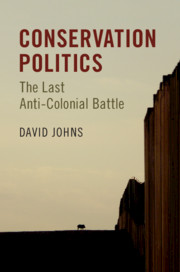Book contents
- Conservation Politics
- Reviews
- Conservation Politics
- Copyright page
- Dedication
- Epigraph
- Contents
- Foreword
- Acknowledgements
- Introduction
- Part I The Problem
- Part II Getting the Questions Right
- Part III Taking the Offensive
- Part IV Culture Change
- 13 Conservation, George Orwell, and Language
- 14 Restoring Story and Myth
- 15 Conservation’s Moral Imperative: The Human Obligation to the Wild
- Conclusion
- Index
- References
15 - Conservation’s Moral Imperative: The Human Obligation to the Wild
from Part IV - Culture Change
Published online by Cambridge University Press: 04 May 2019
- Conservation Politics
- Reviews
- Conservation Politics
- Copyright page
- Dedication
- Epigraph
- Contents
- Foreword
- Acknowledgements
- Introduction
- Part I The Problem
- Part II Getting the Questions Right
- Part III Taking the Offensive
- Part IV Culture Change
- 13 Conservation, George Orwell, and Language
- 14 Restoring Story and Myth
- 15 Conservation’s Moral Imperative: The Human Obligation to the Wild
- Conclusion
- Index
- References
- Type
- Chapter
- Information
- Conservation PoliticsThe Last Anti-Colonial Battle, pp. 352 - 366Publisher: Cambridge University PressPrint publication year: 2019



